-
How an Iowa Dairy Cooperative Built an Export Business to 23 Countries
By USDEC November 2, 2016- Tweet
Swiss Valley Farms was rejected, then rudely insulted, when it first explored exports eight years ago. Today, the small company with a global vision is the 2016 Exporter of the Year.
Chris Hoeger boarded a flight to Mexico City to explore the potential of exports for Swiss Valley Farms.
It was 2008, the 50th anniversary of a cooperative owned and controlled by farmers in Iowa, Wisconsin, Minnesota and Illinois. U.S. dairy exports had risen steadily for several years and presented an obvious growth opportunity, but questions remained:
- Could a small Midwest dairy company far from shipping ports succeed against much bigger players on foreign soil?
- Was there a viable global market for the products and ingredients Swiss Valley offered?
- Could the company adapt to the unique requirements and specifications of customers in other countries?
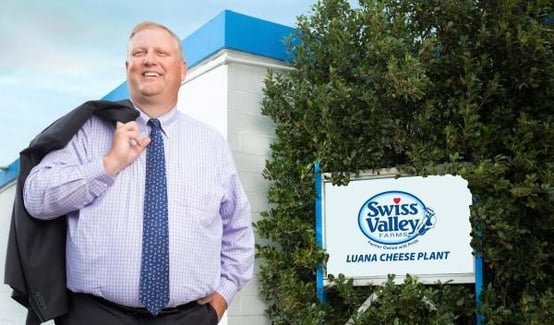
CEO Chris Hoeger has helped guide Swiss Valley Farms to export success
Hoeger, then in sales, armed himself with Swiss Valley samples. Now CEO, he says he will never forget one of his first conversations in Mexico City. The meeting took place in a former jailhouse converted into an office.
A stocky 6-foot-3, Hoeger is hardly tiny, but the distributor he met that day cut an imposing figure, enhanced by a gruff, opinionated demeanor. Hoeger offered samples of Swiss Valley gouda cheese and cream cheese and waited for a reaction.
Instead of being complimentary, the distributor made a rude comment, refusing to take the company or its products seriously.
Persistence pays off
Hoeger and his team could have packed their bags and returned to Iowa after that startling and misguided assessment, but they pressed on to find people in Mexico who liked and bought their products, including one customer still with Swiss Valley today.
That can-do spirit helps explain why Swiss Valley Farms is the 2016 Tom Camerlo Exporter of the Year. The award goes to a U.S. dairy supplier who exemplifies leadership in advancing U.S. dairy exports, demonstrates commitment to export market development and makes exports an integral part of its overall growth strategy. It is presented by Dairy Foods magazine and sponsored by the U.S. Dairy Export Council.
“Swiss Valley Farms illustrates the power of careful planning and perseverance,” says Tom Suber, president of USDEC. “Its distance from most coastal shipping ports can present a challenging supply chain. Like all exporters, the company has encountered a difficult global dairy market slowdown the past two years.
“But Swiss Valley has not only endured, it has grown. The 2016 Exporter of the Year award is validation that a small-to-medium-sized dairy company in the Midwest can, in fact, build a thriving global business.”
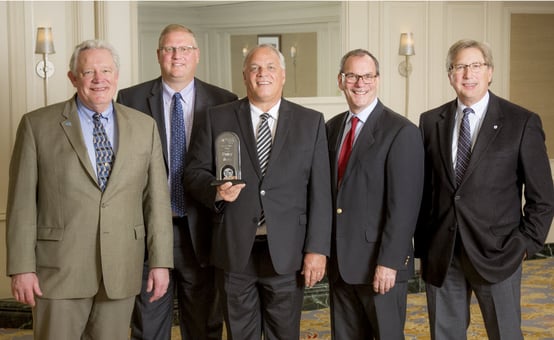
At the USDEC board of directors and membership meeting in October, Swiss Valley Farms received the Tom Camerlo Exporter of the Year Award from Dairy Foods magazine. Pictured (from left) are: USDEC Chairman Paul Rovey, Swiss Valley CEO Chris Hoeger, Swiss Valley Vice President of Sales and Marketing Jay Allison, Dairy Foods magazine editor Jim Carper, and USDEC President Tom Suber.
Swiss Valley Farms now sells to 23 countries, including Canada, Taiwan, China, Japan, Singapore, Malaysia, Indonesia, the Philippines, South Korea, South Africa, Colombia, Chile, Puerto Rico, Saudi Arabia, Dubai, Iraq, Morocco, Dominican Republic, Australia, Vietnam, Panama, Hong Kong and, of course, Mexico.
The challenge of exporting from the Midwest
The co-op operates five cheese plants in Iowa, Minnesota and Wisconsin. The locations create the challenge of getting product to shipping ports located more than 1,500 miles away. Swiss Valley has developed its own method.
Surrounded by cornfields and soybeans, the flagship cheese plant in Luana, Iowa, is quintessentially Midwest in nature. But the peacefulness of the surrounding countryside belies the vibrant activity inside the plant. On a recent September afternoon, workers busily moved cream cheese packets from a conveyor belt into shipping boxes. Forklifts made determined progress to and from the inventory room, their characteristic beeping sounds reverberating throughout. Outside, trucks were readied to transport cream cheese and whey to Chicago, where they would be re-routed to various ports along the east coast, west coast and southern United States.
On the opposite end of the plant from the loading dock, helmeted construction workers with welding equipment prepared a new 49,000-square foot space for expanded production. The $20.6 million expansion project attests to the fact Swiss Valley Farms is bullish on exports.
Growth in the Luana plant’s production capacity will be on the cheese side, which will “significantly add more whey available to be exported and sold domestically,” says Hoeger.
That growth is documented in this video created by Dairy Foods Magazine:
Prospering in a global downturn
In just eight years, Swiss Valley Farms can cite as accomplishments:
- An ability to maintain export volume, despite the downturn in the broader global dairy export market. There may have been a month or two in that time when sales were “soft,” Hoeger says, but overall “our export sales have remained pretty solid and consistent.”
- A focused effort on its global business, starting in 2008. Exports have since grown to $36 million, 9 percent of total company sales.
- An impressive uptick in cream cheese and whey powder exports, including 58 percent growth over the past three years.
- A solid network of sales contacts, including customers, distributors and brokers. A majority of those contacts came through USDEC, Hoeger says. They tap into USDEC staff expertise and resources and take advantage of marketing opportunities. This year, Swiss Valley exhibited in the USDEC booth at both the Gulfood Show in Dubai and the Seoul Food Show in South Korea.
- A strong commitment to quality, including award-winning cheeses, whey and dairy ingredients. For example, Swiss Valley’s cream cheese recently won second place at the 2016 World Championship Cheese Contest.
Competing with the giants
With annual sales of $400 million (exports plus domestic), Swiss Valley Farms isn’t as large as some previous Exporter of the Year winners, which have billions of dollars in revenue.
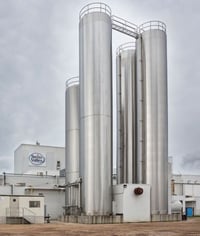 Like any small company that competes with the big guys, the David vs. Goliath approach works as long as you have the right business strategy. For Swiss Valley Farms, it includes marketing a premium product with a high level of customer service.
Like any small company that competes with the big guys, the David vs. Goliath approach works as long as you have the right business strategy. For Swiss Valley Farms, it includes marketing a premium product with a high level of customer service.“That’s been our strategic sales direction,” Hoeger says, “to stay in the upper shelf of high quality and higher value where the customer is looking for more than just product in commodity-type pricing.”
He goes on to credit the company’s employees and the strong support provided by the U.S. Dairy Export Council. Without them, “it wouldn’t be possible for a company of our size even to think about exporting to 23 countries.”
The company tries to allocate its employee resources wisely. Swiss Valley has a dedicated export division with sales representatives who represent the company around the world. Also, it has a customer service department that is fully trained and equipped to handle any customer issues, export paperwork and documentation.
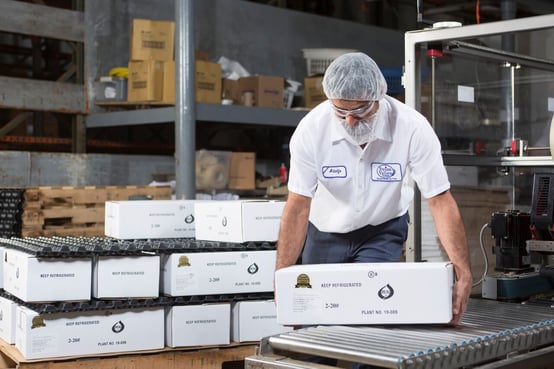
Building global relationships
In turn, positive relationships develop with international customers. For example, one customer in Mexico, whom Swiss Valley asked not to be named, has been with them for five years. The customer credits Swiss Valley for its attention in meeting Mexico’s labeling requirements, health certificates and other documentation.
In one situation, Swiss Valley Farms invested in a packaging redesign of swiss, blue cheese, gorgonzola and cream cheese products distributed through a major Mexican cheese company. The products had to comply with Mexico labeling regulations that took effect in 2011. The project required detailed translation efforts between Swiss Valley’s quality and marketing departments and customers. Swiss Valley Farms also reached out to a third-party verification unit to ensure there would be no issues at the border.
Kevin Stiles, former senior vice president of business development and partnerships at the Midwest Dairy Association, is an impressed observer.
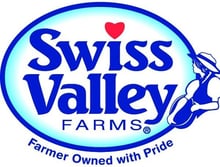 “The company can be admired for the progress it has made in a short period of time,” says Stiles, “developing the market for their products while overcoming challenges in transportation distance, packaging and consumer preferences.”
“The company can be admired for the progress it has made in a short period of time,” says Stiles, “developing the market for their products while overcoming challenges in transportation distance, packaging and consumer preferences.”The gruff Mexican cheese distributor who was rude toward them eight years ago is now an amusing anecdote and distant memory in the company’s success story.
Sales reached $2.3 million in Mexico last year, built on personal connections that began on Hoeger’s first sales trip to Mexico eight years ago. “We are more than partners,” one customer in Mexico told Swiss Valley. “We have developed not just business relations, but friendship relations.”
Mark O'Keefe is vice president of editorial services at the U.S. Dairy Export Council.
Learn more:
Subscribe to the U.S. Dairy Exporter Blog
The U.S. Dairy Export Council fosters collaborative industry partnerships with processors, trading companies and others to enhance global demand for U.S. dairy products and ingredients. USDEC is primarily supported by Dairy Management Inc. through the dairy farmer checkoff. How to republish this post.
10 Most Recent Posts
Most Popular Posts in Past Year
Index of Posts by Topic
- #GotDairyJobs (4)
- About USDEC (67)
- Africa (6)
- Australia (4)
- Blog (8)
- Brazil (4)
- Canada (20)
- Central America (1)
- Cheese (58)
- Chile (1)
- China (54)
- Common food names (7)
- Company News (20)
- Consistent Supply (1)
- Crisis Management (3)
- Cuba (2)
- Dairy (6)
- Dairy checkoff (9)
- Dairy Ingredients (5)
- Dairy Management Inc. (2)
- Dairy Resources (1)
- Dairy Supply Chain (1)
- Dairy Trends (5)
- Documentation (3)
- EU (24)
- Experts on Dairy Exports (4)
- Exporter of the Year (2)
- Exports (24)
- Farmer leaders (1)
- Farming (38)
- Food Aid (8)
- Food Safety (8)
- Foodservice (3)
- Free trade agreements (34)
- Future trends (1)
- Geographical Indications (GIs) (10)
- Global Marketing (86)
- Global Shipping Crisis (1)
- Got Jobs? (9)
- Indonesia (1)
- Innovation (17)
- Japan (17)
- Krysta Harden (1)
- Market Access (25)
- Market Conditions (271)
- Member Services (17)
- Mexico (41)
- Middle East (9)
- Middle East & North Africa (3)
- Middle East/North Africa (9)
- Milk (4)
- Milk Protein Concentrate (MPC) (2)
- New Zealand (11)
- Next5% (20)
- Nonfat Dry Milk/Skim Milk Powder (8)
- Nutrition (19)
- Product Innovation (6)
- Protein (4)
- Regulations (5)
- Research & Data (329)
- Russia (3)
- Singapore (10)
- South America (8)
- South Korea (10)
- Southeast Asia (25)
- Strategic Insights (1)
- Supply (1)
- Sustainability (26)
- Technology (2)
- ThinkUSADairy (5)
- TPM23 (1)
- TPP (13)
- Traceability (8)
- Trade Barriers (5)
- Trade Data (7)
- Trade Policy (72)
- TTIP (5)
- UHT Milk (7)
- USMCA (2)
- Vietnam (4)
- Whey (6)
- Whey Ingredients (2)
- Whey products (10)
- Whole Milk Powder (WMP) (3)
- World Dairy Expo (1)
- World Milk Day (1)
- Yogurt (1)
Index of Posts by Date, Author
- June 2021 (13)
- March 2015 (12)
- September 2015 (12)
- April 2015 (11)
- December 2015 (11)
- March 2014 (10)
- February 2015 (10)
- October 2015 (10)
- October 2014 (9)
- June 2015 (9)
- July 2015 (9)
- November 2015 (9)
- March 2016 (9)
- October 2019 (9)
- September 2013 (8)
- May 2015 (8)
- August 2015 (8)
- January 2016 (8)
- February 2016 (8)
- March 2017 (8)
- December 2018 (8)
- May 2019 (8)
- December 2019 (8)
- June 2014 (7)
- November 2016 (7)
- May 2017 (7)
- May 2018 (7)
- July 2020 (7)
- June 2023 (7)
- July 2016 (6)
- August 2018 (6)
- October 2018 (6)
- November 2018 (6)
- February 2019 (6)
- June 2019 (6)
- August 2019 (6)
- March 2020 (6)
- April 2020 (6)
- June 2020 (6)
- June 2022 (6)
- February 2014 (5)
- June 2016 (5)
- August 2016 (5)
- September 2016 (5)
- December 2016 (5)
- February 2017 (5)
- July 2017 (5)
- October 2017 (5)
- January 2018 (5)
- April 2018 (5)
- June 2018 (5)
- July 2018 (5)
- September 2018 (5)
- January 2019 (5)
- March 2019 (5)
- April 2019 (5)
- July 2019 (5)
- September 2019 (5)
- November 2019 (5)
- January 2020 (5)
- August 2020 (5)
- October 2020 (5)
- April 2021 (5)
- January 2022 (5)
- May 2013 (4)
- September 2014 (4)
- April 2016 (4)
- May 2016 (4)
- October 2016 (4)
- January 2017 (4)
- April 2017 (4)
- June 2017 (4)
- August 2017 (4)
- September 2017 (4)
- December 2017 (4)
- February 2018 (4)
- February 2020 (4)
- May 2020 (4)
- February 2022 (4)
- September 2022 (4)
- April 2023 (4)
- December 2023 (4)
- November 2017 (3)
- March 2018 (3)
- September 2020 (3)
- December 2020 (3)
- February 2021 (3)
- May 2021 (3)
- August 2021 (3)
- December 2021 (3)
- March 2022 (3)
- April 2022 (3)
- May 2022 (3)
- October 2022 (3)
- December 2022 (3)
- May 2023 (3)
- July 2023 (3)
- November 2023 (3)
- January 2026 (3)
- March 2011 (2)
- June 2011 (2)
- September 2011 (2)
- March 2012 (2)
- June 2012 (2)
- July 2012 (2)
- March 2013 (2)
- July 2013 (2)
- November 2020 (2)
- January 2021 (2)
- March 2021 (2)
- July 2021 (2)
- September 2021 (2)
- October 2021 (2)
- November 2021 (2)
- July 2022 (2)
- August 2022 (2)
- January 2023 (2)
- March 2023 (2)
- October 2023 (2)
- January 2024 (2)
- February 2024 (2)
- April 2024 (2)
- June 2024 (2)
- July 2024 (2)
- November 2024 (2)
- December 2024 (2)
- February 2025 (2)
- June 2025 (2)
- July 2025 (2)
- September 2025 (2)
- November 2025 (2)
- December 2025 (2)
- January 2010 (1)
- February 2010 (1)
- March 2010 (1)
- April 2010 (1)
- May 2010 (1)
- June 2010 (1)
- July 2010 (1)
- August 2010 (1)
- September 2010 (1)
- October 2010 (1)
- November 2010 (1)
- December 2010 (1)
- January 2011 (1)
- February 2011 (1)
- April 2011 (1)
- May 2011 (1)
- July 2011 (1)
- August 2011 (1)
- October 2011 (1)
- November 2011 (1)
- December 2011 (1)
- January 2012 (1)
- February 2012 (1)
- April 2012 (1)
- August 2012 (1)
- September 2012 (1)
- October 2012 (1)
- November 2012 (1)
- December 2012 (1)
- January 2013 (1)
- February 2013 (1)
- April 2013 (1)
- June 2013 (1)
- August 2013 (1)
- October 2013 (1)
- November 2013 (1)
- December 2013 (1)
- January 2014 (1)
- April 2014 (1)
- May 2014 (1)
- November 2022 (1)
- February 2023 (1)
- August 2023 (1)
- September 2023 (1)
- March 2024 (1)
- May 2024 (1)
- August 2024 (1)
- September 2024 (1)
- October 2024 (1)
- January 2025 (1)
- March 2025 (1)
- April 2025 (1)
- May 2025 (1)
- August 2025 (1)
- February 2026 (1)
- USDEC (183)
- USDEC Staff (167)
- Alan Levitt (119)
- Tom Suber (41)
- Margaret Speich (22)
- Marc A.H. Beck (15)
- Vikki Nicholson-West (11)
- Angélique Hollister (11)
- Tom Vilsack (8)
- Jaime Castaneda (7)
- Matt McKnight (7)
- Véronique Lagrange (7)
- Margaret Speich and Mark O'Keefe (7)
- Ross Christieson (7)
- Paul Rogers (6)
- Shawna Morris (5)
- William Loux (5)
- Alan Levitt and Marc Beck (5)
- Krysta Harden (4)
- USDEC Communications (3)
- Kristi Saitama (3)
- Marilyn Hershey (3)
- Brad Gehrke (3)
- Tom Quaife (2)
- Nick Gardner (2)
- Jim Mulhern (2)
- Alan Levitt and William Loux (2)
- Kara McDonald (2)
- Luke Waring (2)
- Merle McNeil (2)
- Krysta Harden, USDEC President and CEO (2)
- Andrei Mikhalevsky (1)
- Rodrigo Fernandez (1)
- Dermot Carey (1)
- Jeremy Travis (1)
- Annie Bienvenue (1)
- Ross Christieson and Shawna Morris (1)
- Becky Nyman (1)
- Paul Rogers and Tom Quaife (1)
- Rick Ortman (1)
- Tony Rice (1)
- Barbara O’Brien (1)
- Paul Rogers and Mark O'Keefe (1)
- Dalilah Ghazalay (1)
- Amy Wagner (1)
- Mitchell Bowling (1)
- Erica Louder (1)
- Brad Scott (1)
- Amy Foor (1)
- Scott Lantz (1)
- Sandra Benson (1)
- Errico Auricchio (1)
- Jaclyn Krymowski (1)
.png)

